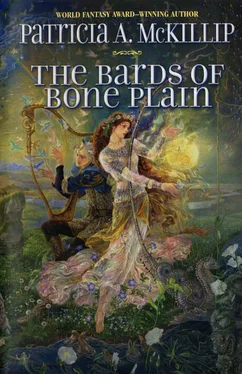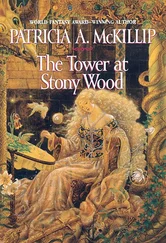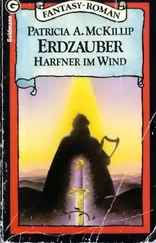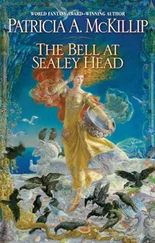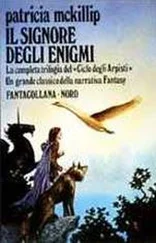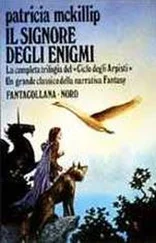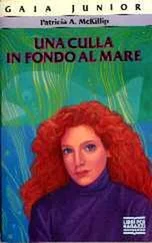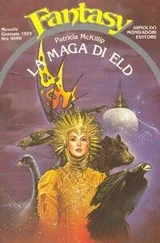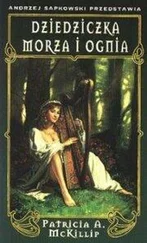The sun lowered over the plain, filled it with light, and shadows stark as the standing stones, then with its absence. The gathering splintered into its smallest fragments to build fires and eat. Later, as evening deepened, one would begin to play again, then another, and listeners would merge again, eddy around the players, then flow away into another pool. Nairn, reluctant to face the unnerved Declan with his own certainty that Welkin would rout even the court bards, wended his way among the colorful camps, wagons, and pavilions toward the brewer’s tavern.
Passing a lovely ivory pavilion hung with bright tapestries and crowned with a flowing pennant, he saw what seemed to be the face of memory, and then again not. He slowed uncertainly. The memory, a tall, graceful young woman dressed in airy silks, her pale hair a mass of curls braided with gold thread and glittering with tiny jewels, looked back at him as she stood at the fire outside the pavilion door.
Again her face stopped his heart. Then she smiled, and it started up again, a bit erratically, like a flutter of wings in his chest. She moved around the fire quickly, leaving the cluster of well-dressed ladies behind her watching curiously, and came eagerly to Nairn’s side.
He whispered, “Odelet.”
She laughed at his expression. “You almost didn’t recognize me. Am I changed so much since you saw me chopping up chickens in the kitchens?”
“Yes,” he said, still breathless. “No. You look—You—What are you doing here?”
“How could I not come? To hear the finest musicians in all the realm. I had to—” She paused, her full lips quirked, her eyes flicking beyond him at her own memories. “I had to make promises to my father, and take my brother Berwin with me before he would give me permission. But nothing too binding ... We heard you play this afternoon. You melted my brother’s heart. I could tell. You played that court ballad of Estmere, and Berwin had tears in his eyes. I didn’t know you learned such music. He wagered money on you. It is extraordinary how gold finds its way into everything, isn’t it? Even love and music.”
“Yes,” he said again, resisting the urge to touch her cool ivory cheek, trace her smile with his fingertips. “Declan has been training me,” he explained. “He wants me to win.”
“Ah.” Her eyes darkened in sudden comprehension. “He wants to send you to King Oroh.”
“Yes.”
“How wonderful. Then you might indeed come to play in my father’s court.” She laughed again, a peal of lovely notes, a little breathless herself, suddenly. “Oh. I hope so. I do hope so.”
He nodded, swallowing. “It is my greatest wish.”
“I miss those evenings when we talked and played. I miss the smell of the plain, the sounds of the wind blowing the long, long way across it.” Her eyes clung to his a moment, the tender green of new leaves, then flicked over his shoulder. She smiled wryly. “There is Berwin wondering where I’ve gone.”
“Will I see you again?”
“Yes. Oh, yes. Listening to every song you play tomorrow.” He felt her fingertips, light and warm, an instant on his wrist. “Look for me.”
“I will,” he promised dazedly. “I will.”
He watched her rejoin her company. The fire billowed between them, and he moved away slowly, still hearing the music of her voice, her clear thoughts, and he realized that nothing Declan might have said would have rendered the complex, improbable matter suddenly so simple: he would win for her.
The tavern was full of people, but the only one he saw, as he walked through the doorway, was Welkin.
He sat on a stool beside the hearth, playing softly, big, callused hands wandering dreamily over the strings. His strange, mismatched, smiling eyes followed Nairn across the room, where a chair waited for him between Osprey and Shea.
The deep voice, rattling shards of shale, stopped Nairn before he reached it.
“Play with me.”
Nairn looked at him silently a moment. Then he laughed. “Why? So you can bring me to my knees again with that harp?”
Welkin’s eyes narrowed slightly, still smiling. “Best the harp then, as well as the harper,” he suggested. “Break my strings and bring me to my knees.”
There were whistles from the onlookers, tankards drummed against wood, a cheerful cry from Osprey.
“I’ll buy the beer.”
Nairn shrugged, preparing for any humiliation; at least, on the final day, he would know what to expect.
He took out his harp, sat down on the bench at the other side of the fire, over which a cauldron of bean and pork and onion stew bubbled richly.
“Supper’s on me,” the brewer told them, pleased at the crowd around his tables, which included several of the court bards, who had no doubt followed Welkin in.
“Kind of you,” Welkin murmured and touched a string. Then he launched into a song so old and rarely played that Nairn barely remembered it had come out of the Marches: “The Riddle of Cornith and Corneath.”
Around and around
The circle of days
Go sun and moon
And my twin eyes:
Guess my name, and you shall take the music of my heart.
Nairn’s fingers were riffling down the strings; he heard his own voice answering before he had begun to think.
Beyond, beneath the world I live
Between the words I lie:
Find my name in wind and light
And you shall hold the secrets of my heart.
“Who are you?” he heard in every lilting line. The one question everyone was asking about Welkin, he was giving back to them in his teasing fashion. He was also revealing something, Nairn realized. The question was there, the answer was there, between the beginning and the end of the ancient lines. All that Nairn needed to win was there. The old doggerel sparked to life. Words said what they meant when they were heeded, which was, in the case of hoary verses older than the standing stones, precisely when they were needed.
He settled into the music, passing verses flawlessly back at Welkin, who told him something else before the interminable song came to an end, and even the court bards shouted with amazement.
The fact that they were still playing together after that hour or two or five, that Welkin and his enchanted harp had not blown Nairn out the door and left him too disheartened to bother finishing the competition meant one mysterious thing.
Nairn had something Welkin needed.
Princess Beatrice heard about the Royal Bard’s decision from her mother, who summoned her before she could flee the castle in her dungarees. The tide had turned in the river; the work crew would be waiting near Dockers Bridge for her to pick them up. She had hoped for a word with Master Burley before she left about the hen scratches she had seen the evening before, drawn with charcoal on the lounge table at the inn. But no: work crew, hen scratches, and any thought about Phelan had to wait while she attended the queen in her mauve-appointed morning room.
As usual, the sight of her daughter in pants and grubby boots caused Queen Harriet to close her eyes and delicately pinch the bridge of her nose. That, as usual, caused her daughter to wonder why, after so many digs, her mother was not inured by now. It was as though she thought she had two daughters named Beatrice and a vague hope that one of them would disappear entirely.
“Yes, Mother?”
The queen opened her eyes again and frowned. “You never appeared at Lady Phillipa’s party for Damen and Daphne’s engagement yesterday. It was noticed. You were missed.”
“They have had so many engagement parties. I didn’t think they’d care.”
Читать дальше
